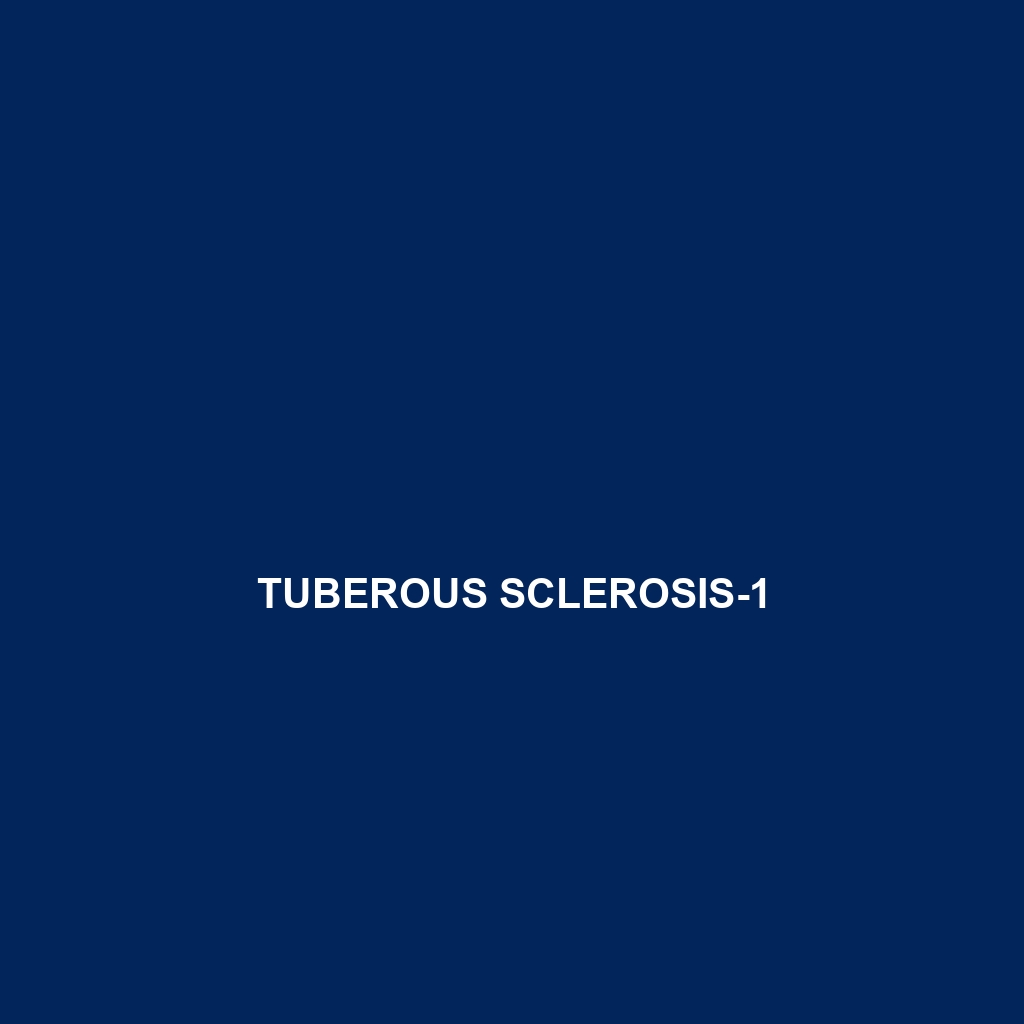Tuberous Sclerosis-1:
Definition and Description of Tuberous Sclerosis-1:
Tuberous Sclerosis-1 (TSC1) is a genetic disorder that leads to the growth of non-cancerous tumors in various organs, particularly the brain, kidneys, heart, eyes, skin, and lungs. This condition is caused by mutations in the TSC1 gene, which is responsible for tumor suppression. Tuberous sclerosis is characterized by the development of hamartomas—benign tumors that can affect normal organ function. The clinical presentation of TSC1 can vary widely among affected individuals, and symptoms often depend on the size and location of the tumors.
Causes of Tuberous Sclerosis-1:
Tuberous Sclerosis-1 is primarily caused by genetic mutations. Approximately two-thirds of cases are inherited in an autosomal dominant pattern, meaning only one copy of the mutated gene from an affected parent can cause the disorder. The TSC1 gene mutation leads to the malfunction of the hamartin protein, which plays a crucial role in cell growth regulation. In some instances, the mutation arises spontaneously (de novo mutations), with no family history of the condition. Environmental factors have not been conclusively linked to TSC1 development.
Associated Symptoms of Tuberous Sclerosis-1:
Common symptoms associated with Tuberous Sclerosis-1 include:
- Seizures: These may range from mild to severe and are often the first sign of TSC1.
- Developmental delays: Children with TSC1 may face challenges in physical, intellectual, or social development.
- Skin lesions: These can include facial angiofibromas, hypomelanotic macules, and shagreen patches.
- Kidney tumors: Renal angiomyolipomas are common, which can lead to kidney dysfunction or bleeding.
- Cardiac rhabdomyomas: These benign tumors can affect heart function, particularly in infants.
Diagnosis of Tuberous Sclerosis-1:
Diagnosis of Tuberous Sclerosis-1 often involves a combination of a medical history review, physical examination, and imaging studies. Physicians may utilize MRI or CT scans to detect brain tumors and ultrasonography for kidney tumors. Genetic testing can confirm mutations in the TSC1 gene, helping to establish a definitive diagnosis. The presence of characteristic skin lesions also aids in diagnosis.
Risk Factors for Tuberous Sclerosis-1:
Individuals with a family history of Tuberous Sclerosis-1 are at a higher risk of developing the disorder. Furthermore, those with existing manifestations of TSC1 symptoms, particularly in young children, should be closely monitored for associated complications. There are no known lifestyle or environmental factors that significantly increase the risk of developing TSC1.
Complications of Tuberous Sclerosis-1:
If left untreated, Tuberous Sclerosis-1 can lead to serious complications, including:
- Severe cognitive impairment: Particularly in cases where neurological involvement is significant.
- Kidney failure: Resulting from extensive kidney tumors or hypertension related to kidney issues.
- Heart complications: Can arise from the presence of cardiac rhabdomyomas.
- Increased susceptibility to tumors in other organs: This necessitates ongoing monitoring.
Treatment Options for Tuberous Sclerosis-1:
Treatment for Tuberous Sclerosis-1 is symptom-based and may include:
- Antiepileptic medications: For managing seizures.
- Regular monitoring: To watch for tumor growth or progression.
- Surgical intervention: May be required for larger tumors or in cases of severe complications.
- Medications like everolimus: Approved for the treatment of certain complications in TSC1.
When to See a Doctor for Tuberous Sclerosis-1:
Patients or caregivers should seek medical attention if any concerning symptoms arise, such as new or worsening seizures, rapid changes in behavior or development in children, unexplained skin changes, or unusual abdominal pain. Early intervention can improve outcomes and help manage the condition effectively.
Prevention of Tuberous Sclerosis-1:
Currently, there are no known preventive measures for Tuberous Sclerosis-1, especially since it is primarily a genetic condition. However, genetic counseling may be beneficial for families with a history of TSC1 to discuss risks and family planning options.
Statistics and Prevalence of Tuberous Sclerosis-1:
Tuberous Sclerosis-1 affects approximately 1 in 6,000 live births, making it a relatively rare genetic disorder. It exhibits equal prevalence across genders and ethnicities, with many cases remaining undiagnosed due to the variability in symptom expression.
Personal Stories or Case Studies about Tuberous Sclerosis-1:
Personal narratives from individuals or families affected by TSC1 provide invaluable insight into living with the condition. Many report facing challenges in educational and healthcare settings due to the lack of awareness regarding TSC1. These stories often highlight the importance of community support and advocacy in managing the disease effectively.
Myths and Misconceptions about Tuberous Sclerosis-1:
A common myth is that Tuberous Sclerosis-1 is always associated with severe cognitive disability; however, the cognitive impact varies widely, with many people living full and productive lives. Another misconception is that TSC1 is contagious or can be prevented through lifestyle choices, which is not the case, as it is a genetic condition.
Support and Resources for Tuberous Sclerosis-1:
For those dealing with Tuberous Sclerosis-1, access to support groups and resources is important for emotional and practical assistance. For more information, visit this support page for additional resources and help.
Conclusion about Tuberous Sclerosis-1:
In summary, Tuberous Sclerosis-1 is a complex genetic disorder that requires careful management and monitoring. Understanding its causes, symptoms, and treatments can empower affected individuals and families. Encouraging early diagnosis and intervention can lead to better health outcomes and improved quality of life. For additional information and support, seeking professional guidance and connecting with community resources is recommended.
